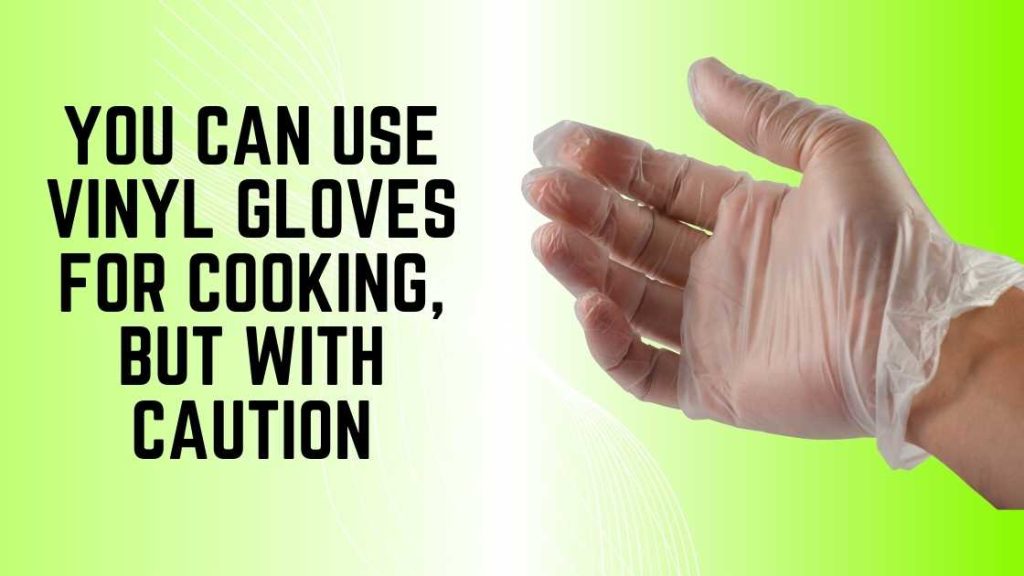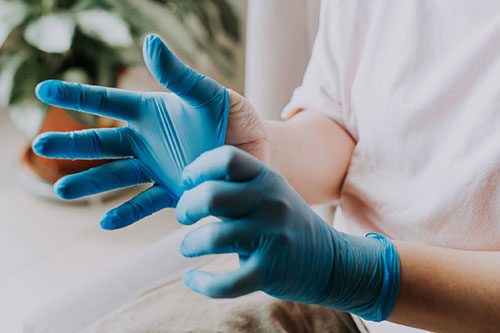Yes, you can use vinyl gloves for cooking, but with caution. Vinyl gloves are commonly used in food preparation due to their affordability and ease of use, but they may not be suitable for all cooking tasks.
In my experience, vinyl gloves are best suited for cold food prep or tasks that don’t involve high heat or oil. For anything more intense, I prefer using nitrile gloves, which offer better protection and durability. If you’re considering using vinyl gloves for cooking, it’s essential to be aware of their limitations and ensure they are appropriate for the specific task at hand.

Vinyl gloves are made from synthetic PVC (polyvinyl chloride) and are generally latex-free, which makes them a good option for people with latex allergies. They are often used in the food industry for tasks like handling raw ingredients or packaging, where the risk of contamination is a concern. However, vinyl gloves have their limitations.
One major drawback is that they are not as durable as other types of gloves, such as nitrile or latex. Vinyl gloves are prone to tearing, especially when exposed to heat, oil, or sharp objects. This can pose a risk if you’re handling hot food or working with cutting tools, as the gloves can easily break, leading to potential contamination or injury.
Additionally, vinyl gloves have a looser fit compared to latex or nitrile, which can make them less comfortable to wear for extended periods. This can also lead to reduced dexterity, making it harder to perform delicate tasks like chopping or mixing.
| Aspect | Vinyl Gloves | Nitrile Gloves | Latex Gloves |
|---|---|---|---|
| Durability | Moderate (Prone to tearing) | High (Resistant to tearing) | High (Resistant to tearing) |
| Heat Resistance | Low (Not suitable for high heat) | High | Moderate |
| Fit and Dexterity | Loose fit, reduced dexterity | Snug fit, high dexterity | Snug fit, high dexterity |
| Allergy-Friendly | Yes (Latex-free) | Yes (Latex-free) | No (Contains latex) |
| Cost | Low | Moderate | Moderate |
| Best Use | Cold food prep, low-risk tasks | All-purpose cooking tasks | All-purpose cooking tasks |
When it comes to food preparation, ensuring hygiene is of utmost importance. Many people wonder if vinyl gloves are suitable for cooking purposes. In this article, we will explore whether or not vinyl gloves are a safe and viable option for use in the kitchen.

Credit: www.amazon.com
Purpose of Vinyl Gloves
Vinyl gloves are commonly used in cooking and food preparation for various purposes. Here’s why they are useful in the kitchen:
1. Hygiene and Food Safety
- Preventing Cross-Contamination: Vinyl gloves help prevent the transfer of bacteria, allergens, and other contaminants from hands to food. This is especially important when handling raw meat, poultry, or seafood.
- Maintaining Cleanliness: They help keep hands clean and reduce the risk of contaminating surfaces and utensils with potentially harmful pathogens.
2. Protection
- Barrier Protection: Vinyl gloves act as a barrier to protect hands from direct contact with food ingredients, especially those that may cause irritation or allergic reactions, such as certain spices, acidic foods, or raw proteins.
- Preventing Skin Damage: For those with sensitive skin or conditions like eczema, vinyl gloves can help prevent irritation and discomfort caused by prolonged contact with food or cleaning agents.
3. Convenience
- Easy Cleanup: After handling food, vinyl gloves can be easily removed and discarded, making cleanup quicker and more efficient.
- Quick Changes: They allow for quick changes between different tasks (e.g., from handling raw meat to preparing vegetables) without needing to wash hands in between.
4. Compliance with Regulations
- Food Safety Standards: In commercial kitchens and food service environments, wearing gloves is often required by health regulations to ensure proper food handling and safety practices.
- Health Inspections: Using gloves can help comply with health and safety regulations, potentially reducing the risk of violations during inspections.
5. Application Versatility
- Handling Ready-to-Eat Foods: Vinyl gloves are ideal for handling ready-to-eat foods where direct hand contact should be minimized to prevent contamination.
- Food Preparation: They are useful for various food preparation tasks, such as mixing, chopping, or portioning, where maintaining hygiene is crucial.
Considerations
- Durability: Vinyl gloves are generally less durable than latex or nitrile gloves and may not be suitable for tasks that involve heavy or sharp objects.
- Allergy-Friendly: They are a good option for those who have latex allergies, as they are made from synthetic materials and do not contain latex proteins.
Best Practices
- Change Gloves Frequently: Replace gloves frequently, especially when switching between handling different types of food or when they become soiled.
- Proper Disposal: Dispose of used gloves properly to prevent contamination and ensure that they do not contribute to environmental waste.
Vinyl gloves are a practical tool in the kitchen for maintaining hygiene, protecting hands, and ensuring food safety, making them a valuable addition to your food preparation practices.

Credit: www.safetyandhealthmagazine.com
Benefits of Using Vinyl Gloves
Using vinyl gloves in food preparation and various other tasks offers several benefits:
1. Hygiene and Safety
- Prevent Cross-Contamination: Vinyl gloves help prevent the transfer of bacteria, allergens, and other contaminants from hands to food, which is crucial for maintaining food safety.
- Protect Food Integrity: They prevent direct contact between hands and food, reducing the risk of contaminating ready-to-eat foods.
2. Convenience
- Easy Cleanup: Vinyl gloves simplify cleanup by keeping hands clean and allowing for easy disposal after use.
- Quick Task Switching: They enable quick transitions between tasks (e.g., from handling raw meat to preparing vegetables) without the need to wash hands in between.
3. Protection
- Barrier Against Irritants: They protect hands from irritation or allergic reactions caused by contact with certain foods, spices, or cleaning chemicals.
- Skin Protection: Vinyl gloves can help prevent skin damage or discomfort for those with sensitive skin or conditions like eczema.
4. Compliance
- Regulatory Requirements: In commercial kitchens and food service settings, vinyl gloves help meet health and safety regulations aimed at ensuring proper food handling practices.
- Health Inspections: Wearing gloves can assist in passing health inspections by demonstrating adherence to hygiene standards.
5. Cost-Effectiveness
- Affordable Option: Vinyl gloves are generally more affordable than latex or nitrile gloves, making them a cost-effective choice for many food preparation tasks.
Limitations of Using Vinyl Gloves
Vinyl gloves are commonly used in various food handling situations, but they have limitations that might affect their suitability for certain cooking tasks. Here’s a detailed look at these limitations:
Durability
- Tear and Puncture Resistance: Vinyl gloves are generally less durable than other types of gloves, such as nitrile or latex. They are prone to tearing or puncturing, which can compromise their protective function during tasks that involve sharp objects or abrasive materials.
Chemical Resistance
- Limited Protection: Vinyl gloves offer minimal resistance to chemicals, oils, and fats. They can break down or degrade when exposed to these substances, making them less suitable for tasks involving heavy-duty cleaning or handling greasy foods.
Fit and Comfort
- Less Stretch: Vinyl gloves are less elastic than latex or nitrile gloves, which can lead to a poor fit. They may feel loose or uncomfortable, especially during prolonged use or when performing precise tasks.
- Reduced Dexterity: The lack of flexibility in vinyl gloves can reduce dexterity, making it more challenging to handle small or delicate items effectively.
Temperature Tolerance
- Low Heat Resistance: Vinyl gloves are not designed to withstand high temperatures. They are not suitable for tasks involving hot foods or surfaces, as they can melt or become damaged when exposed to heat.
Permeability
- Moisture Permeability: Vinyl gloves can become permeable when exposed to moisture for extended periods. This can lead to a breakdown of the glove material and potential contamination of the food being handled.
Single-Use Nature
- Limited Reusability: Vinyl gloves are typically intended for single use, which can lead to higher waste compared to reusable gloves. This is less environmentally friendly and can be more costly over time.
Allergic Reactions
- Potential for Allergies: While vinyl gloves are less likely to cause allergic reactions compared to latex gloves, some individuals may still have sensitivities to the chemicals used in vinyl production.
Best Practices for Using Vinyl Gloves in Cooking
- Appropriate Use: Use vinyl gloves for tasks where durability and chemical resistance are not critical, such as handling pre-packaged food or performing simple, low-risk food preparation tasks.
- Switch to Alternatives: For tasks involving hot foods, chemicals, or intricate handling, consider using nitrile or latex gloves, which offer better durability, flexibility, and protection.
- Ensure Cleanliness: Always use a fresh pair of gloves for each task to maintain hygiene and prevent cross-contamination.
Alternatives for Cooking Gloves
If you are looking for gloves specifically for cooking purposes, there are alternatives that might be more suitable:
| Glove Material | Advantages |
|---|---|
| Nitrile Gloves | Durable, puncture-resistant, and provide excellent protection against chemicals. |
| Latex Gloves | Offer great flexibility, precision, and grip. However, avoid them if you or someone in your household has a latex allergy. |
| Heat-Resistant Gloves | Specifically designed for high-temperature cooking, they provide insulation and protection when handling hot objects. |
Do vinyl gloves provide adequate protection against heat?
Vinyl gloves do not provide significant protection against heat. They are not designed to withstand high temperatures, and using them with hot foods or cooking processes involving heat could lead to melting or degradation of the glove material. For tasks that involve handling hot cookware or hot foods, it is better to use heat-resistant gloves made of materials like silicone or aramid fibers.
Can vinyl gloves be used for food preparation?
Yes, vinyl gloves are commonly used for food preparation. They are suitable for tasks like handling raw vegetables, mixing ingredients, or assembling sandwiches. Vinyl gloves are a popular choice in commercial kitchens and food service settings because they help reduce the risk of cross-contamination and maintain hygiene. They are also cost-effective and comfortable for short-term use.
Are vinyl gloves resistant to chemicals?
Vinyl gloves offer limited resistance to chemicals. They are not ideal for handling strong acids, bases, or solvents, as these chemicals can break down the vinyl material. For tasks that involve chemicals or cleaning agents, it is better to use gloves made from materials with higher chemical resistance, such as nitrile or neoprene gloves.
Can vinyl gloves be used for cooking and baking?
Vinyl gloves can be used for cooking and baking, particularly for tasks that do not involve high heat. They are useful for tasks such as handling dough, mixing ingredients, or preparing cold dishes. However, they should not be used when handling hot foods or cookware, as the heat can cause the gloves to degrade or melt.
How should vinyl gloves be disposed of after use?
Vinyl gloves should be disposed of properly after a single use. They are typically discarded in regular trash bins, as they are not recyclable in most municipal systems. It is important to follow local regulations for glove disposal and ensure that used gloves do not contribute to contamination or littering.
Are vinyl gloves suitable for people with latex allergies?
Vinyl gloves are a good alternative for people with latex allergies. Unlike latex gloves, vinyl gloves do not contain natural rubber latex, which can cause allergic reactions in some individuals. They offer a latex-free option for those who need protection while avoiding potential allergens.
Can vinyl gloves be used multiple times?
Vinyl gloves are designed for single-use and should not be reused. Reusing vinyl gloves can lead to contamination and compromise hygiene. For tasks that require repeated glove use, it is better to use gloves that are designed for multiple uses and can be cleaned or sanitized between uses, such as reusable silicone or nitrile gloves.
How do vinyl gloves compare to other types of gloves for cooking?
Vinyl gloves are less durable and offer lower protection compared to nitrile or latex gloves. Nitrile gloves are more resistant to punctures and chemicals, while latex gloves provide a better fit and more flexibility. For most cooking tasks involving cold foods, vinyl gloves are adequate, but for tasks requiring heat or chemical resistance, other types of gloves may be more appropriate.
Are there any alternatives to vinyl gloves for cooking?
Yes, there are several alternatives to vinyl gloves for cooking. Nitrile gloves are a popular choice due to their durability and resistance to punctures and chemicals. Latex gloves offer a snug fit and flexibility, while silicone gloves provide heat resistance and are reusable. Depending on the specific cooking tasks and needs, choosing the right type of glove can enhance safety and performance.
Final Decision
Although vinyl gloves are cost-effective, comfortable, and latex-free, they are not ideal for cooking purposes. Their lack of heat resistance and lower durability make them less suitable for direct use with hot food items. It is recommended to opt for glove materials such as nitrile, latex, or heat-resistant gloves when cooking to ensure maximum safety and protection.

I may be a little “crazy” when it comes to cooking, but I enjoy every minute of it. Spending time in the kitchen itself, whether with my family or my friends, brings me both happiness and exhilaration. This blog was created to showcase my cooking/eating with family and friends. And also as an opportunity to discuss ideas on food and the culinary circle in general.




Pingback: What Does The Prestige Handi Cooker Do? (1.5 Litre, 3.3 Litre, 5 Liters Pressure Cooker with Video) – Kitchen World